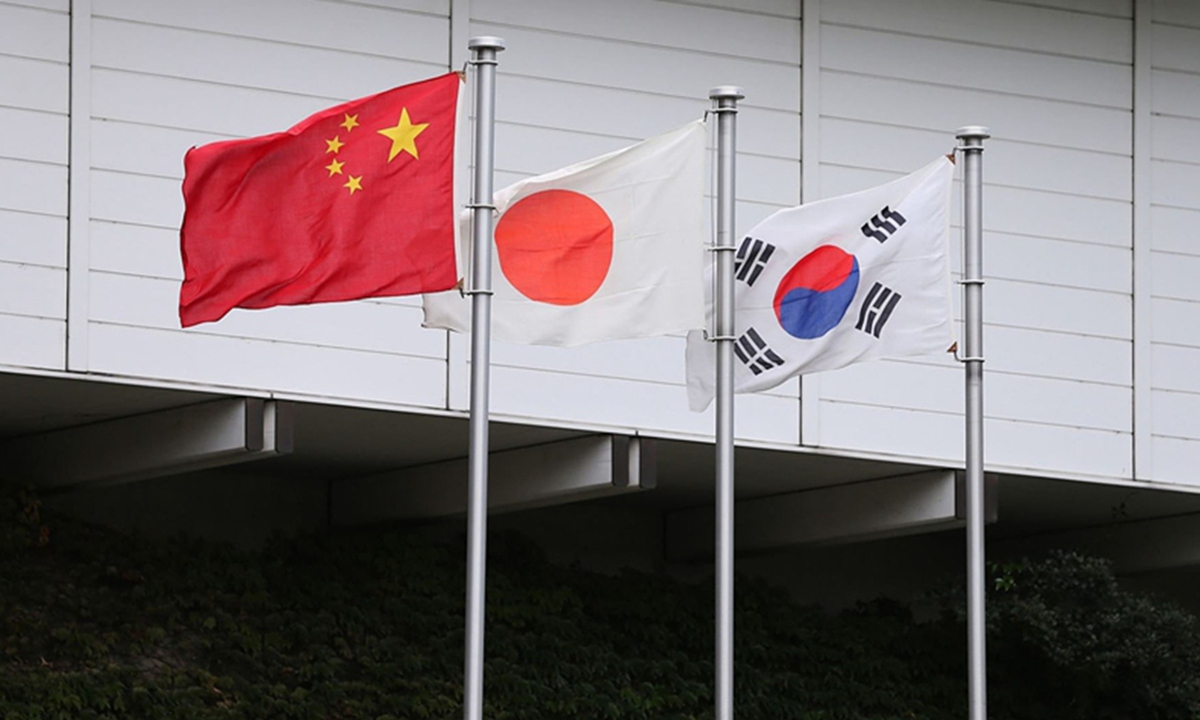Anchoring on ‘future’, China-Japan-SK cooperation this year worth expecting: Global Times editorial

China Japan South Korea File photo:CGTN
The Trilateral Cooperation Secretariat (TCS) recently announced the results of the "CJK Spirit Word of the Year 2025" selection, with the Chinese word for "future" winning the highest number of votes. This has sparked sustained attention across public opinion in the three countries involved - China, Japan and South Korea. TCS secretary-general Lee Hee-seop noted that "future" reflects the optimism and determination of the people in the three countries to build closer ties in the coming years. Japanese media quoted voters in the voting process who expressed hope of overcoming historical and cultural differences through tourism and cultural exchanges, a sentiment symbolized by the term "future." Meanwhile, Chinese netizens commented that warming trilateral relations and the benefits of cooperation are already evident, heralding a highly promising future.Alongside the positive expectations represented by "future" as the word of the year, recent diplomatic engagements and cross-border tourism have shown a strong and vibrant momentum in China-Japan-South Korea relations. China's Ambassador to South Korea, Dai Bing, recently arrived in South Korea to assume his new post and met with South Korean officials, where both sides agreed to jointly promote a healthy, stable, and upward development of their strategic partnership. Late last year, Japanese Minister for Foreign Affairs Takeshi Iwaya visited China. Both sides have sent positive signals about deepening multi-faceted cooperation. With China's visa-free policy now expanded to include Japan and South Korea, outbound tourism to China from both countries has surged. Meanwhile, South Korea is considering a trial visa waiver for Chinese group tourists, and both China and Japan are working to facilitate cross-border travel further. These developments suggest the potential for a booming "weekend tourism circle" among the three nations in 2025.
Amid domestic political changes in South Korea and increasing uncertainty in the regional and global development, maintaining this positive trajectory of trilateral interaction and cooperation is no small feat and deserves careful nurturing. It underscores the significance of the renewed momentum for collaboration following the Ninth ROK-Japan-China Trilateral Summit in May last year. This re-energized cooperation reflects the importance of breaking away from narratives of bloc confrontation and returning to the intrinsic logic of trilateral partnership. When rooted in the actual needs of the three nations and using strategic vision toward the future, this cooperation can play a vital role in overcoming crises and creating shared prosperity for their citizens and the region.
The combined economies of China, Japan, and South Korea account for about 24 percent of the global total, while their total foreign trade accounts for 20 percent of the global volume. It takes less than three hours to fly from major cities in Japan and South Korea to Shanghai, Dalian, Qingdao and other cities in China, highlighting the substantial demand for stronger connections and the immense potential for deepened cooperation among the three countries. Compared to European countries implementing the Schengen visa system or the highly liberalized trade framework in North America, the current level of integration among China, Japan, and South Korea falls short of their strength and demand for cooperation.
Beyond historical factors, the primary obstacles to deeper cooperation stem from geopolitical pressures, with some relationships that could have been mutually beneficial and win-win being constrained by distorted views of competition or bloc politics, which is regrettable.
At present, the aspiration of China, Japan, and South Korea to build a bright future together is presented with new opportunities. The visa-free policies, which have spurred a boom in tourism and exchanges, have created new growth points for the development of trilateral relations and are also strengthening mutual goodwill and understanding among the peoples. The public sentiment and mutual understanding between China, Japan, and South Korea have been stagnating at low levels in recent years, influenced by various factors, many of which stem from misunderstandings and misconceptions caused by communication barriers and gaps. As more Japanese and South Korean tourists "head to China after work on Fridays," in addition to enjoying China's culinary and recreational offerings, they also personally experience China's development and the friendliness and hospitality of its people. This closer interaction and familiarity are expected to substantially improve mutual goodwill and the overall atmosphere between the three nations.
In fact, there are many areas where the three countries can and should cooperate. Last month, the 17th Tripartite Health Ministers' Meeting and the 24th Trilateral Intellectual Property Offices Heads Meeting were held in Tokyo, Japan, and Shanghai, China, respectively. Looking ahead, there is great anticipation for joint efforts to maintain the stability and smooth functioning of industrial and supply chains, as well as achieving breakthroughs in economic and trade cooperation. Exploring collaborative potential in addressing climate change, aging populations, and emerging fields such as artificial intelligence could become new focal points. The solid implementation of cooperation in these areas in 2025 will not only help improve the developmental environments of each country, but also create shared opportunities to achieve higher levels of mutual benefit and win-win outcomes.
The selection of "future" as the Chinese character of the year for 2025 sets a positive tone for trilateral cooperation this year and holds significant implications for the long-term development of China-Japan-South Korea relations. As immovable neighbors, the three nations have vast potential and promising prospects for creating a shared future. Joining hands with a focus on the future is a "1+1+1>3" scenario, benefiting not only the three nations themselves but also contributing to regional peace, stability, and integrated development.
With 2025-2026 designated as the China-Japan-South Korea Year of Cultural Exchange, the three countries should seize this opportunity to strengthen people-to-people and cultural exchanges, activate their cooperation reserves, and "foster greater mutual understanding and strengthened ties between our nations."

